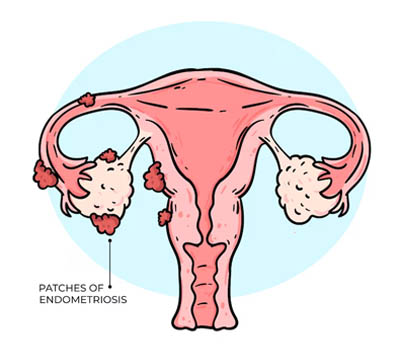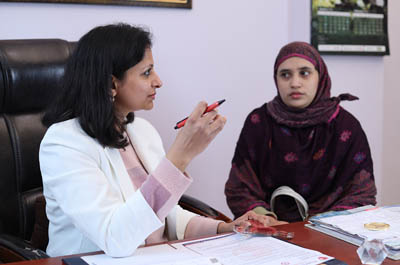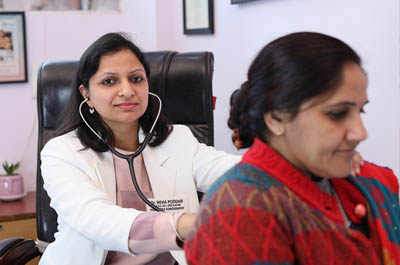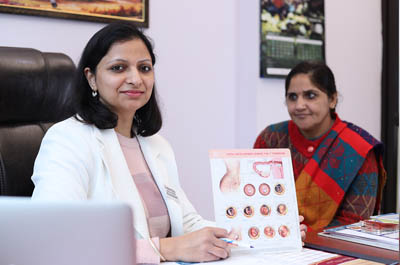
Endometriosis: Understanding, Diagnosis, and Treatment at Precision Gynaecology with Dr. Neha Poddar
Endometriosis is a common condition that affects millions of women worldwide. It occurs when tissue similar to the lining of the uterus (endometrium) grows outside the uterus. This misplaced tissue can cause significant pain, especially during menstruation, and may also lead to fertility issues.
At Precision Gynaecology, Dr. Neha Poddar is dedicated to women's health and offers expert diagnosis, treatment options, and support for women with endometriosis.
Understanding Endometriosis:
-
The endometrium is the tissue that builds up inside the uterus each month and sheds during menstruation.
-
In endometriosis, endometrial-like tissue grows on the ovaries, fallopian tubes, and other pelvic tissues.
-
This misplaced tissue responds to hormonal changes during the menstrual cycle, just like the endometrium in the uterus.
-
As the misplaced tissue grows, it breaks down and bleeds internally each month, causing inflammation, pain, and scar tissue formation.
Symptoms of Endometriosis:
The severity of symptoms in endometriosis can vary greatly from woman to woman. Some women may experience no symptoms at all, while others may have debilitating pain. Common symptoms include:
-
Pelvic pain, especially during menstruation (pain may worsen over time)
-
Pain during or after intercourse
-
Painful bowel movements or urination, especially during menstruation
-
Heavy or prolonged menstrual bleeding
-
Difficulty getting pregnant (infertility)
-
Fatigue, bloating, and other symptoms

Causes:
exact cause of endometriosis is unknown. However, several theories exist, including:
-
Retrograde menstruation: During menstruation, some endometrial tissue may flow backward through the fallopian tubes and implant on the pelvic organs.
-
Cell transformation: Cells lining the pelvic cavity may transform into endometrial-like tissue.
-
Embryonic cell rest theory: Endometrial tissue may be present outside the uterus since embryonic development.
Diagnosis:
Diagnosing endometriosis can be challenging because symptoms can vary. Dr. Poddar will perform a comprehensive evaluation, which may include:
-
Pelvic exam
-
Ultrasound scan
-
Laparoscopy (a minimally invasive surgical procedure using a laparoscope to view the pelvic organs)
Treatment Options:
There is no cure for endometriosis, but treatment can help manage symptoms and improve quality of life. Treatment options may include:
-
Hormonal therapy: Medications like birth control pills or other hormonal medications can regulate menstrual cycles and suppress the growth of endometrial tissue.
-
Pain management: Medication can help manage pain associated with endometriosis.
-
Surgery: Laparoscopic surgery can be used to remove or destroy endometrial implants and scar tissue. In severe cases, a hysterectomy (removal of the uterus) may be considered.
Importance of Early Diagnosis and Treatment:
Early diagnosis and treatment of endometriosis are crucial to prevent complications such as chronic pain, scar tissue formation, and infertility.


Support and Next Steps:
Endometriosis can be a frustrating and sometimes isolating condition. Dr. Poddar understands the physical and emotional challenges faced by women with endometriosis. She will provide a supportive environment, discuss all your treatment options, and develop a personalized plan to manage your symptoms and improve your well-being.
Remember, you are not alone. Endometriosis is a common condition, and there is help available. If you're experiencing pelvic pain, heavy periods, or other symptoms that could be related to endometriosis, schedule an appointment with Dr. Neha Poddar at Precision Gynaecology. Early intervention can help you manage your condition and live a fulfilling life.
FAQS
Endometriosis is a chronic condition in which tissue similar to the lining of the uterus (endometrium) grows outside the uterus, typically on the pelvic organs such as the ovaries, fallopian tubes, and the lining of the pelvic cavity. This tissue responds to hormonal changes during the menstrual cycle, leading to inflammation, scarring, and pain. Endometriosis can cause symptoms such as pelvic pain, painful periods, infertility, and pain during intercourse. Dr. Neha Poddar at Precision Gynaecology specializes in diagnosing and managing endometriosis to improve quality of life for her patients.
The exact cause of endometriosis is not fully understood, but it is believed to involve a combination of genetic, hormonal, and environmental factors. Retrograde menstruation, where menstrual blood flows backward through the fallopian tubes into the pelvic cavity, is one possible cause. Other theories suggest that endometriosis may result from immune system dysfunction or embryonic cell transformation. Dr. Neha Poddar can conduct thorough evaluations to diagnose endometriosis and discuss appropriate treatment options at Precision Gynaecology.
Symptoms of endometriosis may vary in severity and may include pelvic pain or cramping, especially before and during menstruation, painful periods (dysmenorrhea), pain during intercourse, infertility, heavy menstrual bleeding, and gastrointestinal symptoms such as bloating or diarrhea. Some women with endometriosis may also experience fatigue, nausea, or difficulty with bowel movements. If you suspect you may have endometriosis or are experiencing symptoms, it's important to consult with Dr. Neha Poddar for evaluation and management at Precision Gynaecology.
Treatment for endometriosis depends on various factors such as the severity of symptoms, the extent of the disease, and the woman's reproductive goals. Dr. Neha Poddar may recommend conservative treatments such as pain medications, hormone therapy, or lifestyle modifications to manage symptoms. Surgical interventions such as laparoscopic surgery may be necessary to remove endometrial tissue, adhesions, or cysts and improve fertility outcomes. At Precision Gynaecology, Dr. Poddar provides personalized treatment plans tailored to each patient's needs and goals.

Understanding Menopause: Symptoms, Diagnosis, and Treatment at Precision Gynaecology with Dr. Neha Poddar
Menopause, a natural transition in a woman's life, signifies the end of menstruation. It's caused by a decline in estrogen and progesterone production by the ovaries, typically occurring around age 51, but anywhere from your late 40s to mid-50s is possible.
At Precision Gynaecology, Dr. Neha Poddar is dedicated to women's health and understands the unique challenges of menopause. She offers expert diagnosis, treatment options, and support to help you navigate this transition smoothly.
The Stages of Menopause:
-
Perimenopause: This introductory phase leads up to menopause, marked by the ovaries' gradual decrease in estrogen production. Lasting anywhere from several years to a decade, perimenopause can bring on some early signs of menopause, like irregular periods, hot flashes, and night sweats.
-
Menopause: This stage is defined by the absence of menstrual periods for 12 consecutive months.
-
Postmenopause: The years following menopause are termed postmenopause. You might still experience some menopausal symptoms during this phase, although they usually lessen over time.
Symptoms of Menopause:
The menopausal experience varies for each woman, but some common symptoms include:
-
GSM (Genito-uninary Syndrome of Menopause)
-
Hot flashes and night sweats: A sudden feeling of intense heat radiating over the body, often accompanied by sweating, especially at night.
-
Irregular periods: Periods may become shorter, longer, heavier, or lighter than usual before stopping altogether.
-
Vaginal dryness: Reduced estrogen levels can cause vaginal tissues to thin and become less elastic, leading to dryness, discomfort, and pain during intercourse.
-
Difficulty sleeping: Hot flashes and night sweats can disrupt sleep quality, making it hard to fall asleep or stay asleep.
-
Mood swings: Fluctuations in hormone levels can lead to emotional changes, such as irritability, anxiety, or depression.
-
Weight gain: Menopause can cause changes in metabolism, making it easier to gain weight and harder to lose it.
-
Thinning hair and dry skin: Decreased estrogen can affect hair and skin health, leading to thinning hair and drier skin.
-
Loss of breast fullness: Breasts may lose some fullness and firmness due to hormonal changes.
-
Decreased libido: Reduced estrogen levels can cause a decline in sexual desire.

Diagnosis and Treatment at Precision Gynaecology:
Dr. Poddar can diagnose menopause through a comprehensive evaluation, including:
-
Laser Vaginal Therapy
-
Discussion of your symptoms and medical history
-
Physical exam
-
Blood tests to measure hormone levels (optional)
There's no single approach to menopause treatment, but Dr. Poddar will work with you to develop a personalized plan that addresses your specific needs and concerns. Treatment options may include:
-
Lifestyle changes: Maintaining a healthy diet, exercising regularly, and getting enough quality sleep can significantly improve your overall well-being and potentially ease some menopausal symptoms.
-
Hormone therapy: This may involve supplementing the hormones your ovaries no longer produce to manage symptoms like hot flashes, vaginal dryness, and mood swings. However, hormone therapy isn't suitable for everyone and may have side effects, so Dr. Poddar will discuss the risks and benefits thoroughly with you.
-
Over-the-counter medications: Certain over-the-counter medications can help alleviate specific symptoms, such as vaginal moisturizers for dryness or lubricants for intercourse.
-
Complementary and alternative therapies: Some complementary options like acupuncture or yoga may provide relief from certain menopausal symptoms.


Living with Confidence Through Menopause:
Menopause is a natural stage, not a medical condition. Dr. Poddar understands that navigating hormonal changes can be challenging. She is committed to providing a supportive environment and collaborating with you to develop a treatment plan that empowers you to manage your symptoms and embrace this new chapter in your life with confidence.
Remember, you are not alone. Many women experience menopause. If you're experiencing symptoms that disrupt your quality of life, schedule an appointment with Dr. Neha Poddar at Precision Gynaecology. Together, you can explore treatment options and create a personalized plan to help you sail through menopause smoothly.
FAQS
Menopause is a natural biological process that marks the end of a woman's reproductive years. It occurs when the ovaries stop producing eggs and the menstrual cycle ceases permanently. Menopause is typically diagnosed when a woman has gone without a menstrual period for 12 consecutive months. The average age of menopause is around 51, but it can occur earlier or later for some women. Dr. Neha Poddar at Precision Gynaecology specializes in providing personalized care and support for women transitioning through menopause.
Menopause is associated with a wide range of physical and emotional symptoms that may vary in severity and duration from woman to woman. Common symptoms include hot flashes, night sweats, vaginal dryness, sleep disturbances, mood swings, irritability, fatigue, and difficulty concentrating. Some women may also experience changes in libido, weight gain, or urinary symptoms. Dr. Neha Poddar can offer guidance and treatment options to help manage menopausal symptoms and improve quality of life at Precision Gynaecology.
Menopause occurs as a natural part of aging when the ovaries gradually decrease their production of estrogen and progesterone hormones. This decline in hormone levels leads to changes in the menstrual cycle and eventual cessation of periods. Menopause can also be induced prematurely by certain medical treatments such as chemotherapy or surgical removal of the ovaries (oophorectomy). Additionally, some women may experience early menopause due to genetic factors or underlying medical conditions. Dr. Neha Poddar can provide individualized assessments to determine the cause of menopause and offer appropriate management options at Precision Gynaecology.
Management of menopause focuses on alleviating symptoms and reducing the risk of long-term health complications associated with hormonal changes. Dr. Neha Poddar may recommend lifestyle modifications such as regular exercise, healthy diet, stress management techniques, and adequate sleep to help manage menopausal symptoms. Hormone replacement therapy (HRT) or other medications may be prescribed to relieve symptoms such as hot flashes, vaginal dryness, or mood swings. Regular health screenings and preventive care are also important to monitor for potential health risks such as osteoporosis or heart disease. At Precision Gynaecology, Dr. Poddar provides comprehensive care and support to women during the menopausal transition.
- General Gynae
- Menstrual Disorders
- Vaginal discharge
- Cervical Cancer - Screening & Vaccination
- Pelvic inflammatory disease (PID)
- Infertility treatment (IVF & IUI)
- Uterine polyps
- Septate Uterus (Uterine Septum)
- Uterine Fibroids
- Ovarian Cysts
- Dermoid Cysts
- Ectopic Pregnancy
- Endometriosis
- Menopause
- Hormonal Disorders
- PCOS and Hyperprolactinemia
- Gynae Endoscopy
- Uro Gynae
Are you seeking a qualified and experienced gynecologist and obstetrician in Ghaziabad? Look no further than Dr. Neha Poddar!
- Call 9318413696, 9958170476
- Whatsapp 9318413696

Doctors
-

Dr. Madhu Poddar
-

Dr. R.K. Poddar
-

Dr. Neha Poddar
-

Dr. Rahul Poddar